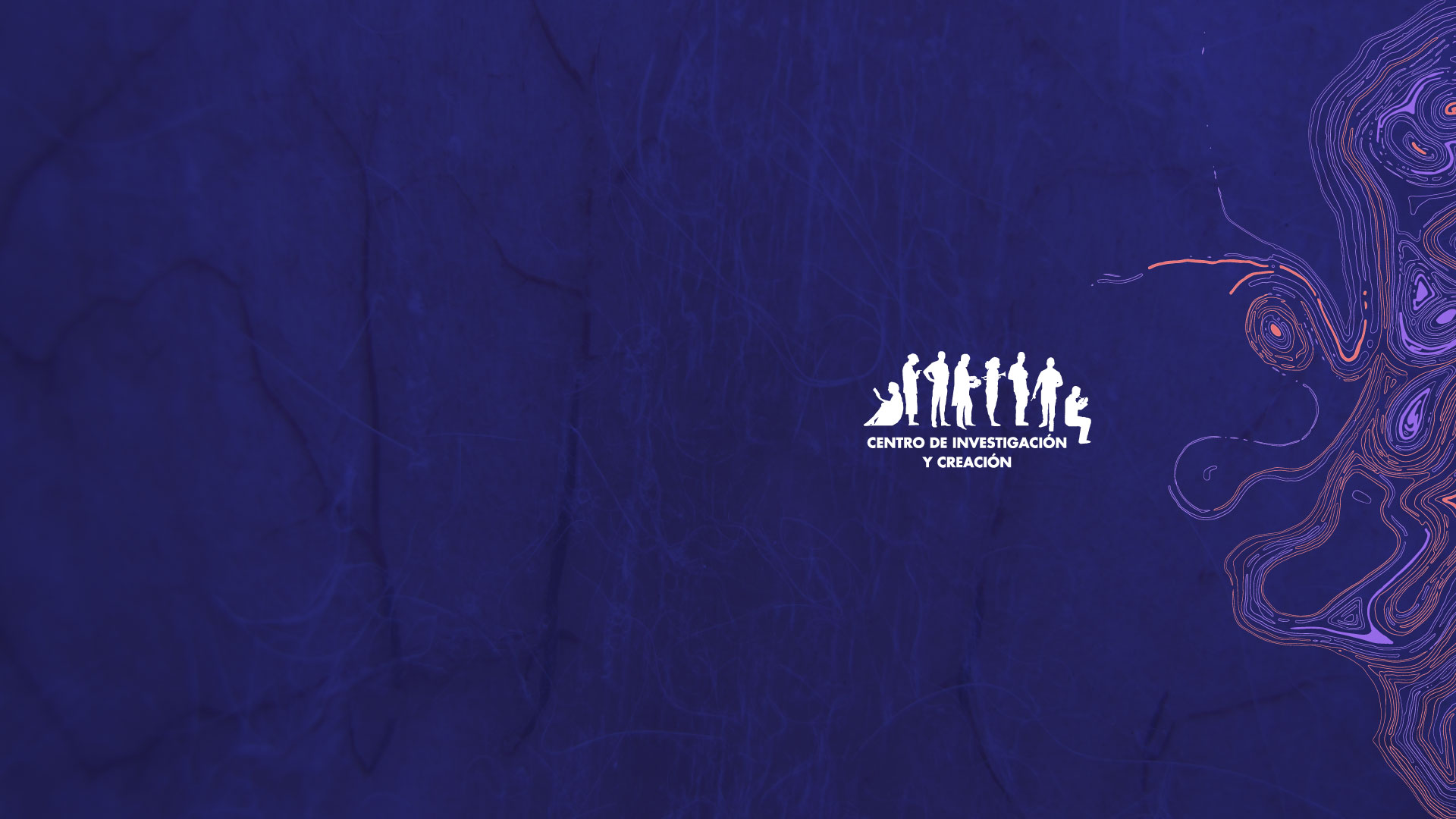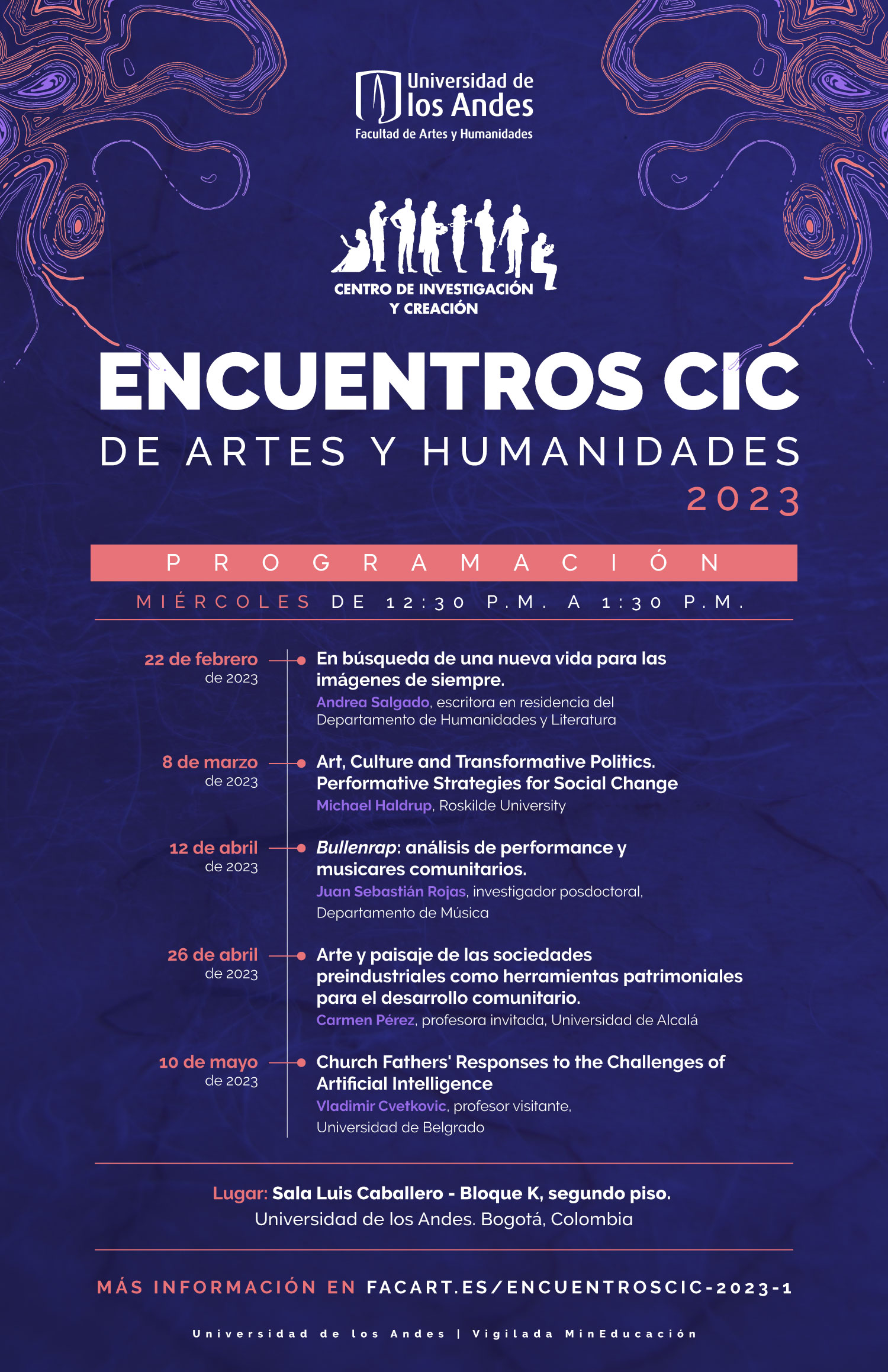
Encuentros CIC de Artes y Humanidades 2023-1
Los Encuentros CIC de Artes y Humanidades son espacios de divulgación de la investigación y la creación de nuestros profesores y estudiantes para conocer nuestra comunidad y estrechar lazos académicos.
Para el primer semestre de 2023 contaremos con cinco charlas ofrecidas por profesores, tanto invitados como de nuestra comunidad.
Los encuentros van del 22 de febrero al 10 de mayo de 2023 y se realizarán en la Sala Luis Caballero (Bloque K, segundo piso) de la Universidad de los Andes a las 12:30 p.m.
La entrada es libre para la comunidad uniandina. Si usted no tiene carnet Uniandes y desea asistir a los eventos, por favor escriba un correo a cic@uniandes.edu.co.

Andrea Salgado, escritora en residencia del Departamento de Humanidades y Literatura
22 de febrero de 2023
La facultad de concebir imágenes, a la que llamamos imaginación, no es solo la capacidad que se tiene de representar o interpretar la realidad, sino que es el poder que permite alterarla. En esta charla, Andrea Salgado, escritora residente, hablará sobre el ejercicio de la imaginación, específicamente a partir de algunas ideas de Ursula K. Le Guin, Angela Carter, Giorgio Agamben y Maurice Blanchot; y mostrará algunos fragmentos de su trabajo en curso.
Michael Haldrup, Roskilde University
8 de marzo de 2023
Departing from Bifo’s proposition for the humanities to contribute to the necessary task of strengthening social ‘futur-ability’, understood as peoples trust and ability to engage with the shaping of the future as a product of collective conscious action, the lecture will attempt to open up dialogues around how to re-imagine social futures in the face of social and environmental injustice. Using examples from three cases on practice-based experiments with transformational politics respectively conditions for disabled young people, LGBTQ+-perspectives on heritage and environmental rights of non-human species, the lecture will explore how speculative theory, design strategies, queer theory and eco-feminism can serve as important inspiration points for mobilizing art and culture as part of performative strategies for social change.
Juan Sebastián Rojas, investigador posdoctoral del Departamento de Música
12 de abril de 2023
Esta ponencia analiza los elementos performáticos y performativos que hacen de la mezcla entre bullerengue y hip-hop una sólida herramienta de construcción comunitaria en el pueblo de Libertad (Sucre)
Carmen Pérez, Universidad de Alcalá
26 de abril de 2023
El proyecto de investigación constituye un análisis de dimensión aplicada que tiene como eje vertebrador los paisajes con arte rupestre como elementos patrimoniales. Analizaremos mediante estudios de caso en Iberoamérica (Colombia y España) de qué manera son puestos en valor y gestionados. También veremos cuáles son los impactos que han generado estos procesos en los territorios donde se insertan, atendiendo especialmente a aquellos que hayan contribuido a la recuperación del tejido social fragmentado por causas históricas. De esta manera, la investigación desde la academia se implica en el entendimiento del patrimonio cultural en nuestro presente como factor de desarrollo, de participación y de empoderamiento de la sociedad civil, especialmente en el medio rural.
Vladimir Cvetkovic, profesor visitante de la Escuela de Posgrados (Universidad de Belgrado)
10 de mayo de 2023
The lecture explores the possibility of employing the doctrines developed by the Church Fathers in solving a number of contemporary questions in the application of artificial intelligence. I will first point to the employment of AI in the surveillance and security systems, autonomous weapons, such as killer drones and robots, and public administrations. Next, I will argue that in spite of the ethically problematic AI employment, it is possible for AI to acquire some very positive knowledge about humankind that is consistent with the principles of Christian, and particularly patristic anthropology. From being employed in these three sectors, AI may acquire the knowledge about the principal dogmas of the Christian Church, namely the dogma of divine incarnation in the human form, the dogma of the death of God on the cross and his subsequent resurrection and the dogma about the equally of humankind in front of God. Next, my focus will shift to four artificial intelligence (AI) questions regarding: a) the consequences of rapid intelligence explosion or the fast ‘take off’, b) the ontological status of cyborgs and uploads, c) the future relations of artificial superintelligence and humanity, and d) the way of aligning the goals of super intelligent machines and humanity. I argue that patristic doctrines about God as Creator who creates humanity according to his image and likeness, about the soul-body relationship originating from the Origenist controversies, about the Chalcedonian definitions of two unconfused and undivided natures of Christ known as Dyophysitism, and about the Dyothelite doctrine of will as natural and personal capacity may be applied in solving above mentioned questions.




